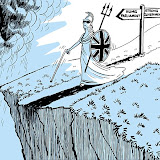The debate in parliament has begun in earnest and the Times of Malta reports Franco Debono’s intervention. The young (no longer youngest) nationalist parliamentarian is busy calling a spade a spade and exploring possibilities of what could have been done and what can be done. Here’s Franco’s (reported) words:
The auditor also spoke about Enemalta having been placed at risk because prototype equipment had been selected. He had pointed to administrative shortcomings, rather than irregularities. He also said he found no hard evidence of corruption. Suspicion, however strong, remained just that unless it was proved, Dr Debono said. The auditor had not found any violation of the laws which would annul the contract. But he said that some things could have been handled differently.
Quite so. If you feel “involved” with Maltese politics – a bit more involved than, let’s say, the UK election would grip you – then you would find this Auditor’s report business quite interesting. The governmental reaction has raised more than a few eyebrows: the bulldozering trademark arrogance of Austin Gatt, the enigmatic responses of PM Gonzi and the foot-in-mouth syndrome that seems to have afflicted Tonio Fenech do nothing to reassure the voter about its capability of handling such situations.
A tender process is about administration. A power plant is about future costs, future environment and future quality of life. Brushing the ugly incosistensies highlighted by the Auditor’s report under the carpet is surely not the way forward. The government’s reaction gives the impression of being as knee-jerk as it is opaque. You do not have to be an energy expert like Profs Mallia to smell that not all is well with the particular options that would be purchased by this tainted contract. The Times editorial had some harsh words for the government on the 5th May:
It would seem that often enough the government is acting rashly as in its enthusiasm to defend itself at all costs it fails to adequately assess the implications of assessments made by those whom it asks to investigate. This has glaringly been the case in the Fairmount ship conversion contracts and, even more so, in that of the award of the contract for new power generation plant at Delimara. It is all very well for the government to say now that it would seriously look into the recommendations made by the Auditor General in the case of the Delimara contract. But the investigation is as yet inconclusive. The mind simply boggles at the number of serious shortcomings listed by the Auditor General. (…) Good governance, propriety and accountability demand that the tale in both cases does not end before the whole truth is found.
Franco Debono’s intervention in parliament tonight is commendable and encouraging. His is the first voice from the government seats to move beyond the hide and seek played over the past week. He may yet vote with the government when push comes to shove but he has now gone on record indicating the necessary remedies for the shortcomings that we have witnessed until now.
Much as Joseph Muscat would like it to seem so, the BWSC contract is not the be all and end all of this government’s term. His grandstanding on the issue – calling for government MPs to vote against the contract, requesting live broadcast on PBS for the parliamentary debate and threatening future “action” risks making a mockery of a valid political point.
The political point is that certain administrative practices must change. The political point is that considerations to be made when administering for the public – tendering contracts for roads, power stations and the like – must no longer be the pocket of entrepreneurs and cliques – they must be the real interests of the people.
Franco Debono makes an interesting step in parliament today. It is not enough. It will not be enough. Nevertheless it is commendable and needs support and encouragement.
Renegade yes, but for a reason.
Meanwhile:
Labour MP Evarist Bartolo concluded his speech saying:
The Labour MP said he agreed with Nationalist MP Franco Debono on the need for a law to regulate political party funding and transparency in this area, so that one would not have corrupt gangs who controlled how decisions were taken.
UPDATE
Listening to audio transmission from Parliament. Minister Tonio Fenech reads from the audiotr’s report “With the benefit of handsight (sic)”… not the best pronunciation. A few seconds later he addresses the opposition “Nispera li tifhmu ghax bl-Ingliz”. We hope so to… between deliverer and recipient there’s not much hope for the Queen’s English is there?
UPDATE II
Just listening to Joseph Muscat makes you sit down and weep. This is not a politician. It is a quasi-journalist living a dream. How can you be “involved” in local politics and not despair at the sad, sad choice that is available to voters. Where are our LibDems???
![Reblog this post [with Zemanta]](http://img.zemanta.com/reblog_e.png?x-id=d20245dd-e93a-49c4-a4fa-1e6a0d61c67f)

![Reblog this post [with Zemanta]](http://img.zemanta.com/reblog_e.png?x-id=e3d348a9-1872-403d-89bc-9134230a50ef)

![Reblog this post [with Zemanta]](http://img.zemanta.com/reblog_e.png?x-id=6db801dc-1d6b-4654-a6ab-df929b176cb5)



![Reblog this post [with Zemanta]](http://img.zemanta.com/reblog_e.png?x-id=c70729ca-577e-4bad-9ef1-1cc9a2e1f978)